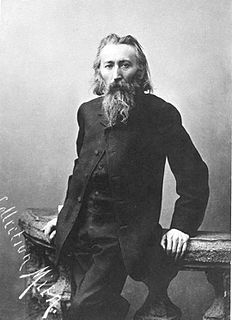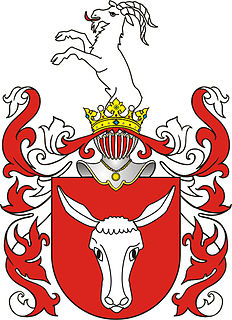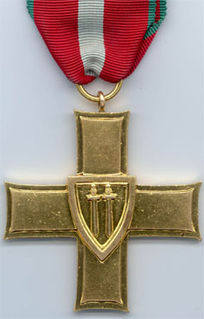
Jan Alojzy Matejko was a Polish painter known for paintings of notable historical Polish political and military events. His works include large oil on canvas paintings like Rejtan (1866), Union of Lublin (1869) or Battle of Grunwald (1878), numerous portraits, a gallery of Polish kings, and murals in St. Mary's Basilica, Kraków. He is referred to as the most famous Polish painter or even the "national painter" of Poland.

Stębark is a village in the administrative district of Gmina Grunwald, within Ostróda County, Warmian-Masurian Voivodeship, in northern Poland. The village is chiefly known for two historic battles which took place there: the 1410 Battle of Grunwald and the (Second) Battle of Tannenberg in World War I.
Grünwald is German for "green forest" and may refer to:

The Hammer Museum, which is affiliated with the University of California, Los Angeles, is an art museum and cultural center known for its artist-centric and progressive array of exhibitions and public programs. Founded in 1990 by the entrepreneur-industrialist Armand Hammer to house his personal art collection, the museum has since expanded its scope to become "the hippest and most culturally relevant institution in town." Particularly important among the museum's critically acclaimed exhibitions are presentations of both historically over-looked and emerging contemporary artists. The Hammer Museum also hosts over 300 programs throughout the year, from lectures, symposia, and readings to concerts and film screenings. As of February 2014, the museum's collections, exhibitions, and programs are completely free to all visitors.

Grunwald is a part of the city of Poznań in western Poland. It was one of the five governmental districts (dzielnica) into which the city was divided prior to 1990, and which are retained for certain administrative purposes.

Półkozic - is a Polish coat of arms. It was used by several szlachta families in the times of the Polish-Lithuanian Commonwealth.

The Luzerner Schilling is an illuminated manuscript of 1513, containing the chronicle of the history of the Swiss Confederation written by Diebold Schilling the Younger of Lucerne.
Count Edward Aleksander Raczyński (1847–1926) was a Polish nobleman, landowner, patron of the arts, and founder of the Raczyński Art Gallery in Rogalin.
Gmina Grunwald is a rural gmina in Ostróda County, Warmian-Masurian Voivodeship, in northern Poland.

The Polish–Lithuanian–Teutonic War or Great War occurred between 1409 and 1411, pitting the allied Kingdom of Poland and Grand Duchy of Lithuania against the Teutonic Knights. Inspired by the local Samogitian uprising, the war began by Teutonic invasion of Poland in August 1409. As neither side was ready for a full-scale war, Wenceslaus IV of Bohemia brokered a nine-month truce. After the truce expired in June 1410, the military-religious monks were decisively defeated in the Battle of Grunwald (Tannenberg), one of the largest battles in medieval Europe. Most of the Teutonic leadership was killed or taken prisoner. While defeated, the Teutonic Knights withstood the siege on their capital in Marienburg (Malbork) and suffered only minimal territorial losses in the Peace of Thorn (1411). Territorial disputes lasted until the Peace of Melno of 1422. However, the Knights never recovered their former power and the financial burden of war reparations caused internal conflicts and economic decline in their lands. The war shifted the balance of power in Central Europe and marked the rise of the Polish–Lithuanian union as the dominant power in the region.

Raudondvaris is a village on the Nevėžis River in Kaunas district, Lithuania, 10 km (6.2 mi) west of Kaunas.

Šarūnas Sauka is a postmodern painter. His father is an eminent Lithuanian philologist Donatas Sauka. In 1989, he was awarded the Lithuanian National Prize.

The Battle of Grunwald is a painting by Jan Matejko depicting the Battle of Grunwald and the victory of the allied Crown of the Kingdom of Poland and Grand Duchy of Lithuania over the Teutonic Order in 1410. The canvas dates to 1878 and is one of the most heroic representations of the history of Poland and Lithuania. It is displayed in the National Museum in Warsaw.

Feliks Sypniewski (1830–1903) was a Polish painter and artist who painted mostly historic battle scenes drawn from the borderlands of Poland and Germany, and his most favourite animal - horses.

The Order of the Cross of Grunwald was a military decoration created in Poland in November 1943 by the High Command of Gwardia Ludowa, a World War II Polish resistance movement organised by the Polish Workers Party. On 20 February 1944 it was confirmed by the State National Council and on 22 December by the Polish Committee of National Liberation and further confirmed on 17 February 1960 by the government of the People's Republic of Poland.

The Grunwald Swords were a gift presented by Ulrich von Jungingen, the Grand Master of the Order of Teutonic Knights, to King Władysław II Jagiełło of Poland and Grand Duke Vytautas of Lithuania on 15 July 1410, just before the Battle of Grunwald (Tannenberg). The gift, a pair of simple bare swords, was a formal invitation to the battle. After the Polish-Lithuanian victory, both swords were taken as a war trophy by King Władysław II to Kraków, Poland's capital at the time, and placed in the treasury of the Royal Wawel Castle.

Béla Iványi-Grünwald was a Hungarian painter, a leading member of the Nagybánya artists' colony and founder of the Kecskemét artists' colony.

Grunwald is a village in the administrative district of Gmina Grunwald, within Ostróda County, Warmian-Masurian Voivodeship, in northern Poland. It lies approximately 26 kilometres (16 mi) south of Ostróda and 43 km (27 mi) south-west of the regional capital Olsztyn. The village has a population of 800.















